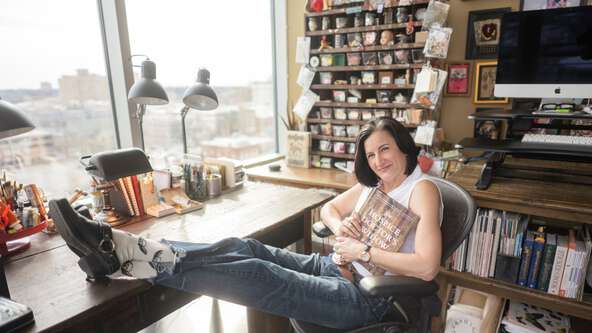A Hospice Doctor’s Widow on the Intimate Conversations We All Need to Have

“Honestly, we talked about death and dying almost every night at the dinner table just because of what he did for a living,” author and speaker Jennifer O’Brien explained to Tulip Cremation.
The author of The Hospice Doctor’s Widow and her husband, Robert Lehmberg, M.D., often talked about the “precious time” his palliative care patients were experiencing at the end of their lives.
But after Lehmberg faced his own grim diagnosis — Stage IV, metastatic cancer — the pair was plunged into their own precious time with its own unique complications and challenges.
O’Brien was by his side for the last 22 months of his life during which they navigated their own DIY palliative care. She respected that her husband didn’t want treatment by his partners or fellows in training and so she gave Lehmberg the ending he chose, though it wasn’t always easy.
The Healing Power of Art
After her husband was diagnosed, O’Brien turned to art journaling, which had brought her comfort for years prior. She switched from analog, paper collages to digital ones to nurture both her brain and heart during this difficult time. She continued for a year and half after he died.
After sharing the stack of papers she’d created, friends and colleagues encouraged her to seek a wider audience for her work, saying it would be helpful to other caregivers. O’Brien published her book in 2020.
Encouraging Conversations, Supporting Caregivers
O’Brien says the main purpose of the book is twofold: to support caregivers and to encourage conversations about the end of life. O’Brien writes that she has helped thousands with these three truths:
- Live more fully by recognizing that at the end of life comes death.
- Family caregiving is both the hardest job and the greatest honor most of us will ever face.
- Grief is abundant love with no place to go.
Advice for Caregivers
After a long career in health care, O’Brien says she now works to help caregivers feel supported while caring for others and taking care of themselves. With these goals in mind, she shared these two additional tips.
These end-of-life conversations are best had before someone gets sick, she explained. While it is "infinitely more important” after a diagnosis, it is also more emotional and difficult. “Try to talk before someone gets sick,” she suggests.
Twice in her book she also shares this advice: “Hoping for the best and preparing for the worst.” She explains that it is an “and” not an “or.” She says that preparing for the end is not a “hope-killer” as some may believe. “We are complex beings, and we are perfectly capable of doing both,” she says.
The Intimacy of End-of-Life Conversations
Though sometimes daunting, talking about someone’s end-of-life wishes is also surprisingly intimate and precious, O’Brien explains. “One of the most intimate things you can do with a person you love is to talk about their end-of-life wishes and commit to carrying those out, regardless of how they align with yours. Whether it is with a parent or spouse ... there is not much else that achieves that in a relationship, that degree of closeness and commitment,” O’Brien said.
The Book
O’Brien’s book is not a self-help guide in the traditional sense, though O’Brien does think it is helpful to those caregivers who see themselves in her struggles. It features copies of emails sent to friends, her worries and concerns illustrated with colorful digital collages, transcripts of interviews between her husband and a physician colleague and honest, raw feelings shared in relatable loopy handwriting.
In it, she does not shy away from mentioning moments of anguish, jealousy, and anger.
Amplifying Her Husband’s Message
Asked how her late husband would view the book, she says she believes he would be proud of it. He was profoundly introverted, she said, and though comfortable with her and in his work, he would not have been able to share his message as far and as wide as she has.
“He did the work patient-to-patient, family-to-family. But I’ve been able, I think, to take this same message that he would provide one-on-one or team-to-family and spread it farther and wider and he would really be pleased about it. I think about it all the time … People who knew him have told me he would be very proud of me and the work I’m doing.”
O’Brien shared that she often wears her wedding ring when she talks with reporters and had forgotten it when we spoke. “I feel like I want him with me. And it’s fine, I know he’s with me anyway.”
O’Brien’s book has won a Nautilus silver award in the Death & Dying/Grief & Loss category, a Next Gen Indie Book gold for Relationships, an Independent Publishers (IPPY) bronze for Gift, and an International Impact Award for its Interior Design.
For 35 years, O’Brien has been a practice management consultant to physicians and served as CEO for two large medical practices. She holds a bachelor’s degree from Boston University and a master’s degree in organization development from Loyola University – Chicago. She lives in Little Rock, Arkansas.